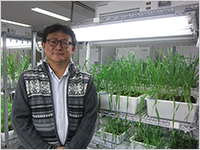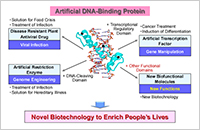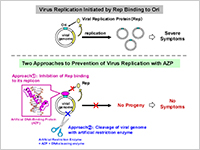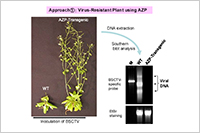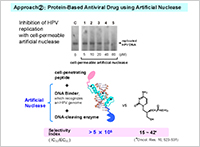Enlarge Image Application of Artificial DNA-Binding Proteins
Enlarge Image Two Approaches to Prevention of Virus Replication with Artificial DNA-Binding Protein
Enlarge Image Approach #1: Virus-Resistant Plant using Artificial DNA-Binding Protein
Enlarge Image Approach #2: Protein-Based Antiviral Drug using Artificial Nuclease
Enlarge Image
Designer DNA-binding proteins to combat viral infections in agriculture and medicine
Takashi Sera
Department of Bioscience and Biotechnology, Okayama University
“Having trained as a chemist, in the early days of my research career I wanted to find ways of treating cancer based on knowledge of organic chemistry,” says Takashi Sera, Professor at Department of Bioscience and Biotechnology. “But I soon realized that chemical molecules are hard and too rigid for such purposes. That is when I decided to focus on the use of proteins.”
And the outcome of this shift in strategy was the development of unique artificial DNA-binding proteins to prevent the proliferation of viruses in both plants and for treating cancer in humans. Specifically, Sera designs DNA-binding proteins to bond to a target virus 1000 times more strongly than the replication protein of the virus itself. Such blocking of bonding between a virus and its own replication protein prevents the spread of the virus.
Important agricultural applications of DNA-binding proteins for producing plants resistant to virus infection include making virus-resistant cassava—a major crop and source of food for millions of people in Africa and Asia. Sera and colleagues have already produced proteins for tomatoes and are currently working on wheat. “The critical point about using DNA-binding proteins for antiviral strategies is that they are expected to be free of side effects,” explains Sera. “The reason is because our proteins are produced by modifying natural proteins that already exist in everyday vegetables and meats.” Sera and his group have also made tests on beet severe curly top virus—spread by so-called beet leafhoppers—that affects crops in western United States.
Sera has also come closer to realizing his dream of treating human cancer. “We are testing our approach for treating human papillomavirus,” explains Sera. “This is strongly linked with cervical cancer. Side effect free treatment is particularly important for treating human diseases.”
- Artificial DNA-binding proteins for disease resistant plant antiviral drugs
- Artificial transcription factor for cancer treatment
- Artificial restriction enzymes for treatment of infections and hereditary illnesses
Summary of recent topics
- T. Sera and C. Uranga, Rational Design of Artificial Zinc-Finger Proteins Using a Nondegenerate Recognition Code Table, Biochemistry, 41, 7074, (2002).
http://www.ncbi.nlm.nih.gov/pubmed/12033941 - K.Tachikawa, O.Schröder, G. Frey, S.P. Briggs, and T.Sera, Regulation of the endogenous VEGF-A gene by exogenous designed regulatory proteins, PNAS, 0406473101, (2004)
http://www.ncbi.nlm.nih.gov/pmc/articles/PMC523457/ - T. Sera, Inhibition of Virus DNA Replication by Artificial Zinc Finger Proteins, J. Virology, 79(4):2614, (2005).
http://www.ncbi.nlm.nih.gov/pubmed/15681461 - T.Mino, T. Mori , Y.Aoyama, T. Sera, Cell-permeable artificial zinc-finger proteins as potent antiviral drugs for human papillomaviruses, Arch Virol, 153:1291, (2008).
http://www.ncbi.nlm.nih.gov/pubmed/18521532 - T. Mino, T. Mori, Y. Aoyama, T. Sera, Gene- and Protein-Delivered Zinc Finger–Staphylococcal Nuclease Hybrid for Inhibition of DNA Replication of Human Papillomavirus, PLoS ONE 8(2): e56633, (2013).
http://www.ncbi.nlm.nih.gov/pmc/articles/PMC3577882/
Related research publications

